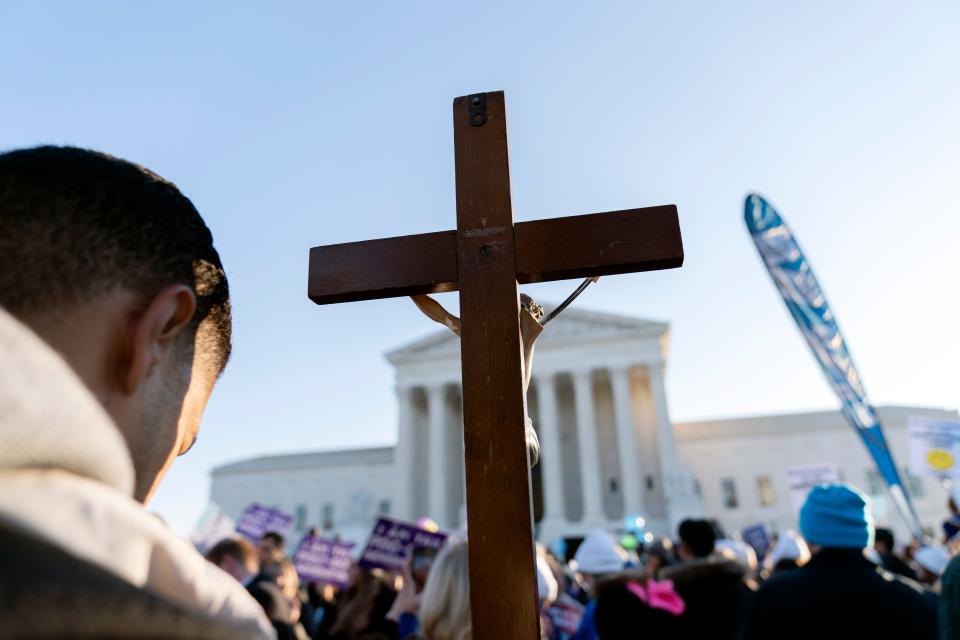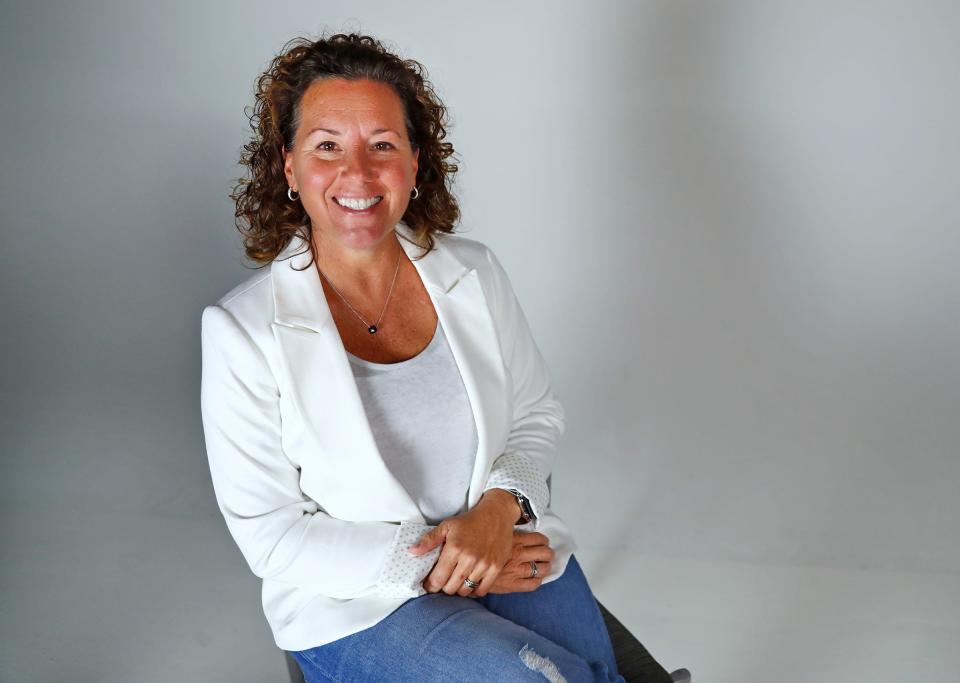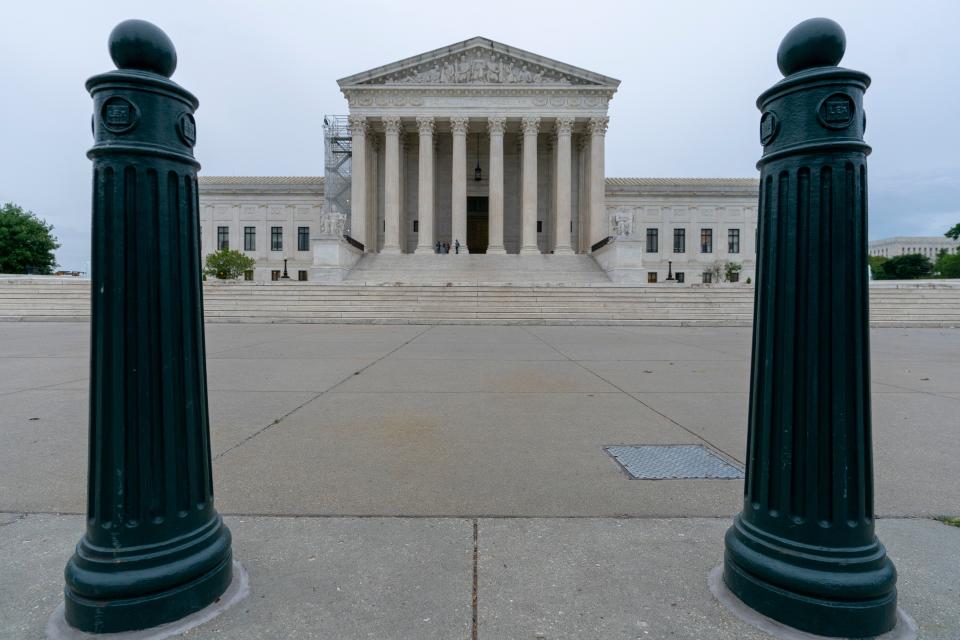LGBTQ vs. Religion: How a gay guidance counselor's firing could affect millions of workers
WASHINGTON − Shelly Fitzgerald had worked for 14 years as a guidance counselor at a Catholic high school in Indianapolis when her bosses told her to clean out her office and banned her from campus.
The reason: School officials discovered Fitzgerald was married to another woman.
Now, Fitzgerald is fighting the school in the latest case to probe the circumstances under which religious entities − such as churches, charities and schools − may fire employees because of their sexual orientation, a termination that would be barred by law if Fitzgerald worked for a public high school or a secular business.
A federal appeals court in Chicago heard arguments in Fitzgerald's case late last week, delving into what has become an evolving question about which employees perform enough religious duties to be considered "ministers," exempt from anti-discrimination laws. The Supreme Court ruled in 2020 that teachers at religious schools fall under that exemption and can be fired. Fitzgerald's case builds on that question: What about guidance counselors?
Tracker: Race, religion and debt: Here are the biggest cases pending at the Supreme Court
Paxton: Defending Trump, battling Democrats: A look at Ken Paxton's mixed Supreme Court record
Why it matters: Advocates say millions of workers could be affected
The stakes are high: Groups supporting Fitzgerald say millions of employees − from nurses at religious hospitals to support staff at religious schools − could be denied anti-discrimination protection if courts continue to expand the scope of the "ministerial exemption." Those protections cover far more than employees' sexual orientation but also guard against discrimination on the basis of sex, race and age.
Religious entities also frame the debate in critical terms: Churches and religious schools say it would violate the Constitution if the government required them to hire employees who disagree with their beliefs.
Fitzgerald's case and others like it are rising through federal courts as the Supreme Court has looked favorably on religious claims, including when they conflict with LGBTQ rights. Two years ago the court unanimously ruled that a Catholic foster care agency could turn away LGBTQ couples as clients. In coming weeks, the justices are set to decide whether a graphic designer in Colorado may turn away couples seeking websites for same-sex weddings.

LGBTQ rights vs. religious freedom: What happened in court?
Fitzgerald's lawyer told the 7th U.S. Circuit Court of Appeals that, as a counselor, she didn't provide spiritual guidance to students but rather helped them get into college. "If the school really did expect them to provide spiritual support, it would provide them with religious training like it did with teachers," said Gabriela Hybel with Americans United for Separation of Church and State, which is representing Fitzgerald.
Joseph Davis, representing Roncalli High School, said the case looks very similar to one decided last year by the same court about a guidance counselor at the same Catholic school. The 7th Circuit sided with the school in that case. "Issues of sexual orientation and the church's teachings on these matters are within the bailiwick of the things that could come in front of a guidance counselor," said Davis, with the Becket Fund for Religious Liberty.
Is a church organist a 'minister'? What about Catholic school janitors?
During arguments on Friday, Judge Joel Flaum pressed the school's attorney to define which employees are exempt from discrimination laws and which are not. What about bus drivers or janitors, he asked.
Davis countered that counselors are different because of the work they perform. Fitzgerald's contract and job description, the school argued, also made clear that part of her job was to pass on the Catholic faith. But Hybel argued that boilerplate language in a contract can't be more important than what an employee actually does at work. And in this case, Hybel said, Fitzgerald's work was secular.
Labor fight: Striking Teamsters ruined a company’s concrete. Supreme Court says union can be sued
Fighting the government: As Supreme Court turns toward end of term, Americans battling the government are winning
The Supreme Court first recognized the ministerial exemption in a unanimous 2012 decision involving a teacher at a Lutheran church and school in Michigan fired after taking leave to deal with illness. Eight years later, the high court expanded the scope of the exemption to include lay teachers who taught secular subjects and had no leadership role. One teacher claimed age discrimination and another claimed she was fired after requesting a leave of absence for cancer treatment.
In another 7th Circuit decision from 2019, the appeals court ruled that an organist at a Chicago church could not sue after leadership fired him. The organist claimed he was fired because of his Polish heritage and said he couldn't be a minister because his job involved only "robotically playing the music that he was given." But the court disagreed, saying that his "organ playing serves a religious function."

'Praying coach' to giant crosses: Religious suits win at Supreme Court
The question of which employees may be exempted from anti-discrimination laws are working their way through the courts as the Supreme Court has increasingly looked favorably on religious claims.
Last year, the court sided with a high school football coach who wanted to pray on the 50-yard line after games. In 2019, the court ruled that a Latin cross on government land outside Washington, D.C., did not have to be moved or altered in the name of church-state separation. It has also repeatedly expanded the ability of public money to be directed toward schools that offer religious instruction, including in a major case last year.
Sundays off: Supreme Court signals support for website designer who wants to decline same-sex weddings
Praying coach: Supreme Court backs praying coach Joseph Kennedy who knelt on the 50-yard line after games
This year, the high court is deciding two significant suits involving religion. One case involves the web developer who wants to decline to make same-sex wedding sites. Another involves a former mail carrier in Pennsylvania who sued the U.S. Postal Service for requiring him to work on Sunday, his Sabbath.

Contributing: Indianapolis Star
This article originally appeared on USA TODAY: LGBTQ at work: Why this Catholic school fired a gay guidance counselor

